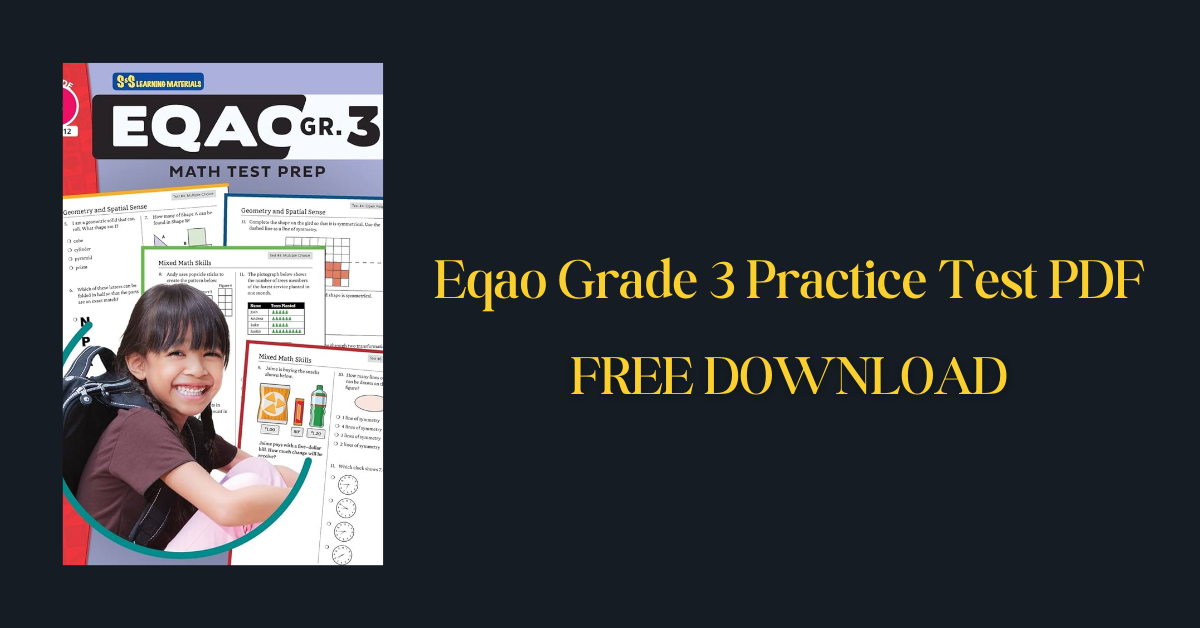EQAO Grade 3 practice tests are an invaluable tool to help students prepare for the Ontario Education Quality and Accountability Office (EQAO) Grade 3 assessments in reading, writing, and mathematics.
These practice tests mirror the format and content of the actual EQAO assessment, giving students the opportunity to familiarize themselves with question types.
The most reliable source for EQAO Grade 3 practice tests is the official EQAO website. Some teachers might also provide additional practice resources tailored to their classroom instruction.
| Name of the PDF | eqao grade 3 practice test pdf |
| No. of pages | 15 |
| Category | |
| Language | English |
| PDF Link | Click Here |
Also Download
What are EQAO Tests
The Education Quality and Accountability Office (EQAO) is an independent agency of the Ontario government responsible for creating and administering standardized assessments across the province. These assessments measure student achievement in reading, writing, and mathematics at key stages of their education (Grades 3, 6, 9, and 10).
EQAO tests are designed to align with the Ontario curriculum, and the results provide valuable information to educators, parents, and the public about the overall effectiveness of the education system. The data is used to identify areas for improvement, support targeted teaching strategies, and ensure that all students have the foundational skills needed to succeed in school and beyond.
Key Components of the Grade 3 EQAO Test
Reading: Students will encounter various texts including stories, poems, and informational articles. They’ll be asked to demonstrate their comprehension through tasks like identifying the main idea, making inferences based on the text, understanding vocabulary in context, and analyzing the author’s purpose.
Writing: The writing component focuses on several different forms. Students might be given a prompt to write an opinion piece, craft a short story (narrative writing), or produce an informational text that explains a topic. Regardless of the specific task, Grade 3 students are expected to demonstrate proper sentence structure, grammar, punctuation, and the ability to organize their ideas clearly.
Mathematics: The mathematics section covers core concepts essential for a Grade 3 student. These include:
- Number Sense and Numeration: Understanding numbers, place value, counting, comparing quantities, and basic operations (addition, subtraction, multiplication, and division).
- Measurement: Analyzing length, mass, capacity, and time using standard units of measurement.
- Geometry and Spatial Sense: Identifying and describing shapes, understanding concepts of location and movement.
- Patterning and Algebra: Recognizing, describing, and extending patterns, as well as basic algebraic thinking.
- Data Management and Probability: Collecting and organizing data, creating simple graphs, and exploring basic concepts of chance.
Why are EQAO Grade 3 Practice Tests Important
EQAO Grade 3 practice tests are important for several reasons:
Familiarization with the Test Format: Practice tests help students become comfortable with the structure of the EQAO, the types of questions they will see, and the time limits for each section. This reduces anxiety and allows them to focus on demonstrating their skills on the actual test day.
Identifying Strengths and Weaknesses: When students complete practice tests and review their results, they gain valuable insights into their areas of understanding and where they might need additional support. This allows parents and teachers to tailor their help and focus on the concepts a student is struggling with.
Developing Test-Taking Strategies: Beyond specific subject knowledge, practice tests help students learn how to manage their time, approach different question types, and avoid common errors. These strategic skills are crucial for success on any standardized test.
Building Confidence: Completing a practice test successfully is a confidence booster for students. They can see concrete evidence of their progress and feel more assured about their abilities leading up to the actual assessment.
Supporting Overall Learning: While designed to mimic the EQAO, practice tests inherently reinforce foundational reading, writing, and math skills that are essential for success in Grade 3 and beyond. The act of practicing strengthens a student’s knowledge base.
Benefits of EQAO Grade 3 Practice Tests
For Students
- Reduced Test Anxiety: Becoming familiar with the test format and question types beforehand helps students feel less stressed on test day.
- Improved Time Management: Practice tests teach students to pace themselves, allocate time effectively between questions and sections, and avoid getting stuck.
- Skill Reinforcement: The act of completing practice questions strengthens core reading, writing, and math skills, benefiting students beyond just the EQAO.
- Boosted Confidence: Performing well on practice tests builds confidence and a positive mindset towards the actual assessment.
For Teachers
- Identify Areas for Improvement: Practice test results help teachers pinpoint specific concepts or skills where the class (or individual students) may need additional support.
- Inform Instruction: Teachers can use the information to adjust lessons, provide targeted practice, and differentiate their teaching strategies.
For Parents
- Understand Child’s Progress: Practice tests give parents a clearer picture of where their child stands relative to the grade-level expectations.
- Support Learning at Home: Parents can use the results to focus on areas of weakness, providing extra practice or engaging activities outside of school hours.
For The Education System
- Measure Overall Achievement: The EQAO, in conjunction with practice tests, provides a snapshot of how well Grade 3 students are meeting curriculum standards across the province.
- Data-Driven Improvement: The aggregated results can identify broader trends, helping to shape educational policy and resource allocation for better student outcomes.
How to Use the EQAO Grade 3 Practice Tests
Finding the Right Practice Tests: Start by seeking out reliable sources for EQAO Grade 3 practice materials. The official EQAO website is the most trusted source, providing sample tests that accurately represent the format of the actual assessment. Additionally, your child’s teacher may have valuable resources or recommendations tailored to their classroom learning.
Creating a Test-Like Setting: To get the most out of the practice test, try to replicate the real EQAO test environment. Enforce the designated time limits to help your child manage their time wisely. Find a quiet and distraction-free workspace, and ensure they have the necessary tools and understand how to navigate an online test if applicable.
Reviewing Results Strategically: Don’t focus solely on the final score on the practice test. Carefully review both correct and incorrect answers. Look for patterns in your mistakes – do you struggle with a specific type of question or a particular skill? These insights will guide your targeted practice sessions later. If the practice test offers answer explanations, take the time to review them and ensure you grasp the concepts.
Using Results to Improve: The practice test highlights areas where you need extra help. Devote additional time to reinforcing these weaker skills using worksheets, online exercises, games, or other engaging learning methods. Collaborate with your teacher and share the practice test results for personalized support and recommendations.
Beyond the Practice Test: Remember that practice tests are a helpful tool for learning and a way to reduce anxiety surrounding the real assessment. Celebrate your hard work and focus on the progress you make along the way. Understand that practice tests should never replace regular and consistent engagement with reading, writing, and math, which are crucial building blocks for overall success.
Conclusion
EQAO Grade 3 practice tests are an invaluable asset for students, parents, and teachers alike. By simulating the test experience, identifying areas for improvement, and fostering essential test-taking skills, these practice sessions build a strong foundation for success on the EQAO.
Remember, the practice tests are not about achieving perfection but rather about pinpointing strengths, targeting weaknesses, and instilling a sense of confidence in your young learner. With consistent practice and a focus on the learning process, your child will approach the EQAO assessment feeling prepared and ready to demonstrate their best.
FAQs
Where can I find official EQAO Grade 3 practice tests?
The most reliable source for official practice tests is the EQAO website. Their sample tests are designed to closely resemble the format, question types, and difficulty level of the real EQAO assessment. This ensures that the practice experience translates directly to improved performance on test day.
How often should I take practice tests?
It’s best to start your practice a few months before the actual EQAO and spread out a few practice tests over that timeframe. Doing multiple tests helps you track improvement and build confidence. However, avoid cramming too many practice tests right before the assessment, as this could lead to increased anxiety instead of preparedness.
Should I use a timer during practice tests?
Absolutely! One of the key benefits of practice tests is learning time management. Mimic the time limits of the real EQAO by using a timer during practice. This helps you understand how long you can spend on each question and avoid running out of time on the actual test.
What do I do if I score poorly on a practice test?
Remember, practice tests are a powerful learning tool, not just a way to measure your current ability. If you score low on a practice test, don’t be discouraged. Instead, carefully review both correct and incorrect answers to identify areas where you need additional support. Use this information to focus on reinforcing those concepts before the actual EQAO.
I get anxious about tests. How can practice tests help?
Practice tests are excellent for reducing test anxiety. The more familiar you are with the format, question types, and what is expected, the less overwhelming the actual test will feel. Think of practice tests as a way to confront the unknown and build your confidence for the real assessment.
Are practice tests a replacement for regular learning activities?
No, practice tests are designed to supplement and reinforce ongoing learning activities in reading, writing, and math. Regular engagement with these subjects builds a strong knowledge base, making both practice tests and the EQAO itself much easier.

Niketa Mulay, a seasoned content writer and editor, has over a decade of experience. With a Master’s in Journalism, she honed her skills at The Times of India and now freelances across various industries. Passionate about reading, writing, and scuba diving, she shares expert PDF guides and tips at PDFdrivehub.com.




